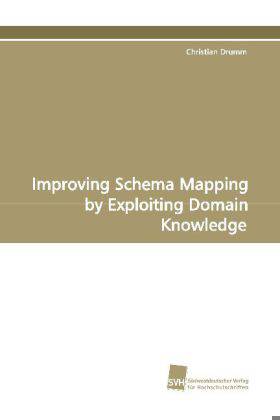
Door een staking bij bpost kan je online bestelling op dit moment iets langer onderweg zijn dan voorzien. Dringend iets nodig? Onze winkels ontvangen jou met open armen!
- Afhalen na 1 uur in een winkel met voorraad
- Gratis thuislevering in België vanaf € 30
- Ruim aanbod met 7 miljoen producten
Door een staking bij bpost kan je online bestelling op dit moment iets langer onderweg zijn dan voorzien. Dringend iets nodig? Onze winkels ontvangen jou met open armen!
- Afhalen na 1 uur in een winkel met voorraad
- Gratis thuislevering in België vanaf € 30
- Ruim aanbod met 7 miljoen producten
Zoeken
€ 88,95
+ 177 punten
Omschrijving
This dissertation addresses the problem of semi-automatically creating schema mappings. The need for developing schema mappings is a pervasive problem in many integration scenarios. Although the problem is well-known and a large body of work exists in the area, the development of schema mappings is today largely performed manually in industrial integration scenarios. In this thesis an approach for the semi-automatic creation of schema mappings based on a central ontology is developed. The central ontology stores domain as well as integration knowledge. Using this ontology as a basis, schema mappings of high quality can be created automatically. In summary, the presented results show that by exploiting background knowledge automatic schema mapping can be developed to a level where it is applicable in complex industrial scenarios. Furthermore, novel knowledge collection approaches complimenting the mapping approach by presenting non-intrusive methods for collecting the required background knowledge from business users are presented.
Specificaties
Betrokkenen
- Auteur(s):
- Uitgeverij:
Inhoud
- Aantal bladzijden:
- 240
- Taal:
- Duits
Eigenschappen
- Productcode (EAN):
- 9783838102931
- Verschijningsdatum:
- 17/02/2009
- Uitvoering:
- Paperback
- Formaat:
- Trade paperback (VS)
- Afmetingen:
- 152 mm x 229 mm
- Gewicht:
- 326 g

Alleen bij Standaard Boekhandel
+ 177 punten op je klantenkaart van Standaard Boekhandel
Beoordelingen
We publiceren alleen reviews die voldoen aan de voorwaarden voor reviews. Bekijk onze voorwaarden voor reviews.











